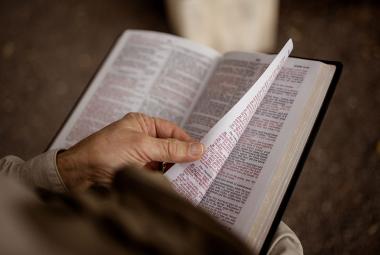Whose sermons are quoted most in the Bible? The answer may surprise you. Just as the New Testament epistles are our primary interpretive commentary on the historical narratives (the Gospels and Acts), the most venerated portion of the Old Testament - the Torah - has, within it, its primary commentary in the form of three sermons by its principal author, Moses.
And Moses was eminently qualified to speak for God. He was more than Israel's human Lawgiver: he was the founder of Israel's religion; he was the mediator of the covenant at Sinai; he was Israel's first prophet.1 (Though God called Abraham a prophet,2 Israel did not then exist as a nation.) Through Moses, God set such a high standard for the people that all subsequent prophets lived under his shadow, never attaining to it, until the coming of the Lord Jesus Christ.
Not surprisingly, the New Testament authors mentioned Moses more frequently than any other Old Testament person. His concluding remarks after a 120-year lifetime have been handed down to us as the Book of Deuteronomy. Deuteronomy is essentially a series of sermons by the greatest Old Testament prophet. Jesus Himself quoted more from Deuteronomy than from any other portion of the Old Testament. (In a sense, Deuteronomy is the "Book of Romans" of the Old Testament.)
The Hebrew title of the book is 'elleh haddebarim ("these are the words") in keeping with the Hebrew custom of often titling a work by its first word(s). The English title Deuteronomy stems from the Septuagint's mistranslation of Deuteronomy 17:18, "this repetition of the Law." The Septuagint translated those words deuteronomion (deutero means "two" or "second," and nomion is "law"; lit., "second Law"), which were rendered Deuteronomium in the Vulgate, Jerome's fourth-century Latin translation of the Bible.
Moses' words were addressed to all Israel, an expression used at least 12 times in the book. Its frequent occurrence emphasizes the unity of Israel which was brought about by God's mighty deliverance of the nation from Egypt, and by her acceptance of His covenant at Sinai. They were uniquely God's people, the only nation on earth that had as its "Constitution" the Word of God.
Sometimes very crucial progress occurs at an excruciatingly slow pace. From Horeb to Kadesh Barnea was only about 200 miles. The Israelites turned an 11-day journey - from Horeb (another word for Mount Sinai)3 to Kadesh Barnea, the first site for entering into the Promised Land from the south - into a 40-year wandering in the wilderness before they came to their second potential site for entering the land.
It took only three days to get Israel out of Egypt; but it took 40 years to get "Egypt" out of Israel! As Stephen pointed out centuries later,4 the Israelites had always been slow to believe God.
Lessons in Trust
God led them into the desert where they had no alternatives but to trust Him or to murmur against Him. In the desert they could not produce their own food but had to depend on God for food and, thus, for their very lives. When Moses reminded them that they did not live on bread alone he meant that even their food was decreed by the Word of God. They had manna because it came by His command. It was therefore ultimately not bread that kept them alive but His Word! "Bread alone," that is, bread acquired independently of His Word, could not keep them alive.
This was why Jesus refused Satan's temptation to turn the stones into bread when He was in the wilderness.5 Jesus knew that God had not decreed those stones for His food, and also that His Father would provide food apart from the Son's working of a miracle at the suggestion of Satan.6 It is significant that each of the three temptations were met by a quote from the Book of Deuteronomy.
Virtually every day the Lord finds different ways to ask us, "Do you trust Me?" This pillar of a book has many critical lessons for our own walk as well! It is important to fully appreciate that these words are, indeed, the craftsmanship of the Creator Himself.
The book can also be viewed as a basic "Constitution" for the nation, following the classic ancient treaty structure: a prologue, basic stipulations, detailed stipulations, a document clause, followed by blessings if followed, cursings if not followed, and a recapitulation. But there are also a number of more puzzling issues.
Strange Genocide
One of the disturbing paradoxes in the Old Testament is God's instruction to destroy all the nations within the borders of Canaan. This always strikes us as incompatible with the Gospel of Love in the New Testament. The command to destroy them totally, that is, men, women, and children, strikes us as unethical for a loving God.
In addition to understanding the paramount importance of keeping this emergent nation from the infections and contamination of the paganism practiced by the indigenous tribes, we must also understand the bizarre origins of these tribes: the Rephaim, the Horim, the Emim, the Zamsumin, et al.
When God covenanted the land of Israel to Abraham He also announced that his descendants would return after 400 years to receive their inheritance.7 That gave Satan four centuries to lay down a minefield in his continuing attempts to thwart the plans of God. Thus, when Moses sent the 12 spies to reconnoiter the land they encountered Nephilim in the land!8 The Rephaim were apparently a reprise of the very hybrids, the Nephilim, that gave rise to the Flood in Noah's day. (You won't understand most of the historical, and prophetic, passages in the Old Testament unless you thoroughly understand the strange goings-on in Genesis 6.)
A Treasure Chest of Discoveries
Moses' review of the Law includes many crucial issues such as the legitimacy of war, the role of capital punishment, divorce, as well as the proper forms of worship, keeping the Sabbath, etc. But the surprise for many are the prophetic aspects of this foundational book: the future history of Israel-including an astonishing prediction of the Holocaust, etc.9 However, all Scriptures are Christ centered,10 so perhaps most challenging for the dedicated students are the "types" and "macrocodes" throughout the book.
We find them in the roles of the goel, the Kinsman-Redeemer, the cities of refuge, the levirate marriage, and the many calendar issues. The many parallels between "The Prophet of Moses," and the Messiah are fascinating: both were spared in infancy;11 both renounced a royal court;12 both had compassion for the people;13 both made intercession for their people;14 both spoke with God face to face;15 both were the mediator of a covenant;16 and both yielded the greatest revelation of their respective testaments.17
Basic Message
God has not changed since then. Man has not changed since then. And God's primary message through His servant Moses was Love. Not a list of do's and don'ts, not legalism, but relationship. And, of course, the ultimate consummation of all these things was, and is, fulfilled in our Kinsman-Redeemer, the Lord Jesus Christ.18 God always rewards the diligent student, and a careful review of this foundational book is guaranteed to be life-changing! See our Expositional Commentary on Deuteronomy for an in-depth study!
Notes:
- Deuteronomy 34:10.
- Genesis. 20:7.
- Cf. Exodus 34:2, 27 with Deuteronomy 5:2.
- Acts 7:39, 51.
- Matthew 4:3-4.
- Cf. Matthew 7:9.
- Genesis 15:13-16.
- Numbers 13:33; Nephilim, the same term for these strange hybrids as the one used in Genesis 6:4.
- Deuteronomy 29, 30.
- John 5:39; Psalm 40:7; Matthew 5:17,18.
- Exodus 2; Matthew 2:13-23.
- Hebrews 11:24-27; Philippians 2:5-8.
- Numbers 27:17; Matthew 9:36.
- Deuteronomy 9:18; Hebrews 7:25.
- Exodus 34:29-30; 2 Corinthians 3:7.
- Deuteronomy 29:1; Hebrews 8:6,7.
- Cf. Matthew 21:11; Luke 7:16; John 5:46; Acts 3:22; 7:37; Hebrews 3:2-6.
- Deuteronomy 18:15-19; John 1:21; 6:14; 7:40; Matthew 22:35-40; Mark 12:28-34; Luke 10:25-28.






